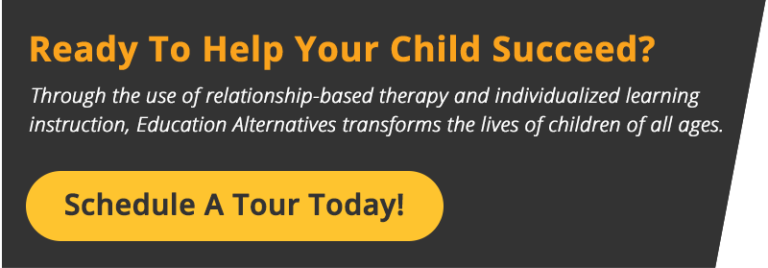Understanding Applied Behavioral Analysis (ABA) Therapy for Autism
If you or a loved one has autism, then you understand how it can make it difficult for someone to function independently. Sometimes autism can make people behave in ways that are not productive or beneficial to themselves or others. At Education Alternatives (EA), we understand why children with autism may behave differently, and we understand that these children and their parents want to create a path toward success and independence.
ABA therapy is the most tried and true therapeutic method in most cases of autism. This is why our Coral Autism Program makes the most of ABA therapy with each of our students. So how does ABA therapy work? For the most part, it will look something like this:
- Assessing the student and his or her behaviors, needs, and goals
- Developing a plan to help the student function independently and improve any behaviors that are inhibiting him or her from doing so
- Including parents, guardians, and other family members and equipping them to continue therapeutic support and practices at home
- Evaluating the student’s progress regularly and making adjustments or setting new goals as necessary
Our Coral Autism Program follows the A-B-Cs of ABA therapy: antecedent, behavior, and consequence. We seek to understand what situation or trigger happened prior to the behavior. We seek to understand the behavior and why it’s happening, and we use positive reinforcement to encourage the new, desired behavior.
Does ABA Therapy Work?
Yes! ABA therapy has proven effective for many children who have undergone this therapeutic method. Because we are dedicated to using positive reinforcement at EA, our students often thrive and go on to live independent and successful lives.
What Does an ABA Therapist Do?
A therapist will use ABA to help a child with autism succeed. First, the therapist will conduct an assessment by speaking with the parents, observing the child, and reviewing any records relevant to the student’s case.
The therapist will then develop a plan of action for the student depending on his or her specific needs and goals, as well as include family members who will continue therapeutic support at home. Finally, a therapist will conduct regular evaluations to assess the student’s progress and make adjustments as needed.
Additional Services Through EA’s Coral Autism Program
Supplemental Programming
Many children with autism need additional support in other areas as well. At EA, we also offer services like occupational therapy and speech pathology that can be paired with ABA therapy. Our EA students also have the option of learning life skills at our VisionQuest transition program to help older adolescents develop the skills needed for independent living and adulthood.
Sensory Spaces
All children need assistance with learning to regulate their emotions, and this can be especially challenging for children with autism. Our sensory rooms are available for students when emotions are running high. These rooms allow students to process their emotions through visual, auditory, and tactile aids.
REACH Behavioral Health
If your student is enrolled in the Coral Autism Program, you and your family also qualify for services through REACH Behavioral Health, which includes individual and family therapy as well as psychiatry. We also offer telehealth services if it would be more comfortable for your family to have sessions at home.
Working holistically with families improves outcomes and creates multiple pathways for growth, understanding, and progress.
Contact Us to Discuss ABA Therapy
Ready to learn more or get started? Reach out to our team and we’ll be in touch shortly!

